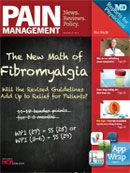Publication
Article
Pain Management
Treating Painful Gout Recently Became Much More Expensive
Prior to an FDA ban on unapproved colchicine products, the drugs cost roughly $0.10 a pill. Now, there is only one FDA-approved colchicine product, and it costs $5 a pill.
As part of its Unapproved Drugs Initiative (http://HCP.LV/lOkCpc) designed to remove unapproved drugs from the market by means of a “risk-based enforcement program” that concentrates on products that “pose the highest threat to public health and without imposing undue burdens on consumers, or unnecessarily disrupting the market,” the FDA last year ordered a halt to the manufacture, distribution, and marketing of unapproved single-ingredient oral colchicines (http://HCP.LV/lRvxsW). These medications were widely used for the daily prevention of painful gout and to treat acute gout flare-ups.
The FDA acknowledged that although “many single-ingredient oral colchicine products have been used by the medical community for decades,” because these medications had not undergone the FDA approval process, their makers rarely provided physicians and patients with the important safety data and information about drug interactions and dosing that are essential when making informed treatment decisions.
At the time of the announcement, Janet Woodcock, MD, director of the FDA Center for Drug Evaluation and Research (CDER), said “The need for drugs to go through the FDA approval process is clearly demonstrated by our review of oral colchicine tablets. Without our safety review and proper drug labeling, the old standard of care would likely have continued, to the detriment of patients.”
Noting that the unapproved colchicine medications had never been evaluated by the FDA and thus should not be viewed as generic drugs, which must be approved by the FDA to assure that they “meet the same standards as the innovator drug,” Deborah M. Autor, director of the CDER Office of Compliance, said “It is a priority for the FDA to get unapproved medications, such as older versions of single ingredient oral colchicine, either updated to conform to FDA’s current approval standards or off the market.”
One source of FDA-approved colchicine for gout
The only company manufacturing and marketing single-ingredient colchicine medications that applied for FDA approval and submitted its product to the rigorous testing process was URL Pharma, maker of Colcrys (http://HCP.LV/kICN71). Whereas many of the older, now-banned unapproved formulations of colchicine were available for mere pennies per pill, URL Pharma priced Colcrys at $5.00 per pill. The company said the price was justified by the high cost of approval testing, colchicine research, and physician education. As reported in the online magazine Slate (http://HCP.LV/inWQ3j), the company also was granted three years of market exclusivity for Colcrys for the treatment of gout. The Slate piece also reported that URL Pharma and the FDA defended the process by pointing out the safety con-cerns surrounding the use of unapproved colchicines, claiming that colchicine had been associated with more than 100 drug-related deaths, half of which involved an interaction between colchicine and the antibiotic clarithromycin.
Now, for the first time, the medication label for colchicine includes dosing and drug-interaction information. URL Pharma also contends that its research discovered that the drug was effective at much lower dosages than which it was commonly prescribed, another safety benefit from the approval process that also resulted in reduced side effects for patients.
Not everybody was happy with this turn of events
The removal of alternative colchicine products from the market, coupled with the high price of Colcrys, prompted physicians and patients alike to raise concerns over limited access to a drug that was relied on by thousands of patients. An advocacy letter sent to members by the American College of Rheumatology (http://HCP.LV/lAPxfE) stated that “the unanticipated increase in cost for colchicine has been extremely disappointing to all of us and our patients,” and notified members that the ACR had contacted several manufacturers of unapproved colchicine “to encourage new drug applications for FDA approval of chronic gout” in the hopes that market competition for URL Pharma and Colcrys would result in lower prices.
In response to these concerns, URL Pharma announced an “enhanced” version of the Colcrys Co-Pay Assistance Program (http://HCP.LV/iKo578) that provides coupons to patients with health insurance. enabling them to obtain Colcrys for $15.00 per month. In a “Colcrys Myths and Facts” resource on its website (http://HCP.LV/m4eVgm), the company also notes that uninsured and Medicare Part D patients with household incomes of up to three times the federal poverty level can receive Colcrys free of charge; patients with household incomes between three to four times the federal poverty level can get Colcrys for $5 a month.
